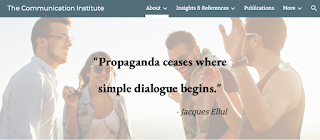"Propaganda ceases where simple dialogue begins." – Jacques Ellul
If you care for freedoms of thought, speech, and association, you can help counter fake news, disinformation, pseudo-populism, and propaganda. Anyone paying attention knows that this public discourse is used to undermine democracy by polarizing families, friends, and neighbors.
As far back as 2007, George Pullman wrote that some people were emboldened in digital media:
...by a sense of anonymity to abandon normal decorums. The most common breaches are trolling and flaming–saying provocative things in order to stir up trouble or launching uncalled-for personal attacks (Pullman, p. 21).
Many resources are accessible to help address these blights on our public communication (Link here to The Communication Institute, selected references). Creative conversations on the broadcast media can help to bridge new understandings. Some thoughtful media commentators do show how to do this.
We can also learn much from the methods of public diplomacy "...to put in place measures to build mutual understanding" (Snow). Amid tensions greater than most of us ever encounter, diplomats and other negotiators frequently find ways to defuse situations and engage with difficult people.
But isn't it time to unleash much more soft power? After all, it is collaborative efforts that forge and evolve representative democracies. And so many of us in our work or personal life commonly commit to collaboration (Cross).
Surely, it's time for citizens in democratic nations to more vigorously empower efforts to help blunt and counter manufactured outrage. You don't need education in journalism or a PhD to:
...open up the heart, the mind, the listening ears to find out about the other person, so that you can learn better how to come together (Snow).
Of course, sometimes we'll have to decide about fight or flight as preferable options. But rather than just speechifying, or endless handwringing, or indulging in often-pointless fact-checking, what's potentially more potent is to practice I.A. Richards's:
...new definition of rhetoric, as being the study of misunderstanding and its remedies... [shifting]... the focus from manufactured belief among non-believers to seeking agreement through clarification (Pullman, p. 17).
With efforts of so many people worldwide directed to strengthening democracies, there are reasons for hope. It's time to build on the electoral successes that strengthen democracy, by engaging "...deeply-held, and often unexamined desires, needs, expectations, and fears" (Cross)–just as we do in the workplace or at home.
References:
Rob Cross (2022), "Where We Go Wrong with Collaboration," Harvard Business Review, April 4, https://hbr.org/2022/04/where-we-go-wrong-with-collaboration
Jacques Ellul (1965), Propaganda: The Formation of Men's Attitudes, New York: Knopf, p. 6
George Pullman (2007), "Rhetorically Speaking, What's New?" in Susan E. Thomas (Ed.), What is the New Rhetoric?, Newcastle, UK: Cambridge Scholars Publishing, https://books.google.com/books/about/What_is_the_New_Rhetoric.html?id=eeoYBwAAQBAJ
Nancy Snow (2020), Unmasking the Virus: Public Diplomacy and the Pandemic, Public Diplomacy Council, the Public Diplomacy Association of America, and the USC Annenberg Center for Communications Leadership & Policy, June 9, https://www.youtube.com/watch?v=v6jA_JaSefc [see also: Nancy Snow and Nicholas J. Cull (Eds.) (2020), Routledge Handbook of Public Diplomacy, 2nd ed, New York: Routledge]
